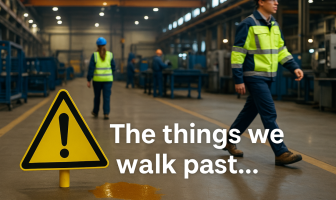
Two words that are guaranteed to reduce work place stress and improve productivity… “Well done”.
The breathtakingly simple act of telling your staff how much you appreciate them will put smiles on faces and lift your workplace safety climate in an instant.
Receiving praise triggers the release of a neurotransmitter that lights up the reward and pleasure centres of the brain. This neurotransmitter is well known as a bringer of happiness, but interestingly it also gives us improved problem solving skills, better attention spans and hugely boosts creative thinking. Praise has also been scientifically shown to improve motor skills and memory.
As with all rewards, the fuzzy glow from receiving genuine praise and recognition is addictive and elicits the same response in all of us: we lift our game in anticipation of receiving more. Appreciated people are happier and nicer to each other, so there is a domino effect that can sweep through your company at every level. People also take that happiness home with them too.
Staff that are regularly praised have fewer accidents at work
A Gallup survey of 4 million employees worldwide found that employees who receive regular praise are more productive, more engaged, have fewer accidents on the job and have overall better safety records. They even enjoy better health all round than employees who are not. These findings are also reflected in the bottom line too, as customers of the appreciated employees reported higher satisfaction and loyalty scores. Employees that are not adequately recognised at work are three times more likely to leave their jobs the following year, regardless of how much training or salary that they have received.
If sincere and genuine praising of staff is not part of your workplace safety culture, then make it so today.
It is free of cost and yet utterly priceless.
Four more ways to instantly improve workplace stress levels
There are four other ways to instantly reduce workplace stress that are not quite so reminiscent of a warm hug, but nonetheless just as easy to put in place and tremendously effective:
1. Install a suggestion box in staff rooms – invite staff to anonymously report the things that cause them stress at work. Then come up with ideas for tackling the issues and feed these ideas back to staff at tool box talks or other open staff meetings.
2. Significant, long term workplace stress can be caused by something as innocuous as a chair or a desk that needs replacing or adjusting. Use the services of an Occupational Health expert to appraise all equipment that is used on a daily basis and ensure that chronic pain and discomfort are not silently reeking havoc within your operation.
3. Make sure people do not miss their lunch break – that down-time is a critical opportunity to stop and breathe. Low glucose levels in the blood need topping up, as do water levels (and caffeine levels for some of us). If missing your lunch break most days means that you can’t get your job done then you are over-stretched and need to delegate or discuss further with your management or colleagues – plain and simple.
4. Be empathetic – staff and colleagues must know that they can come to you for support and that their concerns will be taken seriously. Stress is an inevitable part of any job, it should be legitimised and brought out from the murky shadows of “not coping” so that you can shine a spotlight onto it and work out how to tackle it.
All of these things should be part of any programme designed to reduce stress in your workplace and are a fundamental part of a good workplace safety culture.
Do you have a clear picture of the safety culture within your operation? If not, then you really should find out.
Please contact our Training Consultants to find out what effect your operation’s safety culture is having on the stress levels of your workforce. We can also help you bring those levels down across your whole organisation so that you have a happier, healthier and more productive staff.
Stress reduction programmes give results. The online retailer QVC for example, reduced long term sickness by 20% in just one year and 40% of staff reported that what they learnt during the process also positively affected their life outside work. The place to start is an examination of your Safety Culture.
So, now that you have read this, relax those shoulders, take a deep breath and go out there and dish out some well-earned praise.
Speak to our Training Consultants T: 01928 515977 for further information.




